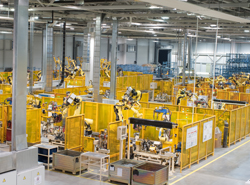Holistic factory simulation increases competitiveness
Setting up, monitoring and running manufacturing facilities is currently quite complicated, requiring significant time and incurring substantial costs. With the new VFF developed by a large EU consortium within the context of the project 'Holistic, extensible, scalable and standard Virtual Factory Framework' (VFF)(opens in new window), the future of EU manufacturing is certain to be bright. VFF's framework can be used both to test possibilities before construction of a new plant and to evaluate a working plant without interfering with its processes. By treating the factory as a product and covering its entire life cycle, scientists were able to adopt existing product life cycle management tools and methods in a factory data model for real-time management of buildings, processes, resources and products. The VFF(opens in new window) enables data availability and consistency among 23 functional modules that utilise the various tools for design, management, evaluation and reconfiguration. In addition, it creates a collaborative network of all people working on the same project to save time and costs and to enhance efficiency. Finally, development of appropriate taxonomy rules and semantics was critical for proper structuring and information sharing. Researchers set ambitious goals for major improvements in European manufacturing. The VFF is expected to cut design, reconfiguration or reengineering time in half and decrease set-up time by 30 % with rapid and accurate prediction and optimisation of production processes. Similarly, virtual representation of all production phases and their interdependencies should decrease process variation and defects. In this era of deep economic crisis, numerous small- and medium-sized enterprises in the manufacturing sector have been particularly hard hit. Without the financial resources available for new product and facility development, they must often stick with proven products and processes. The open-source modules will level the playing field, providing advanced support to these enterprises. With the regained freedom of innovation for which they are famous, they will also have access to tools facilitating rapid transformation of new concepts to market applications and commercialisation.



